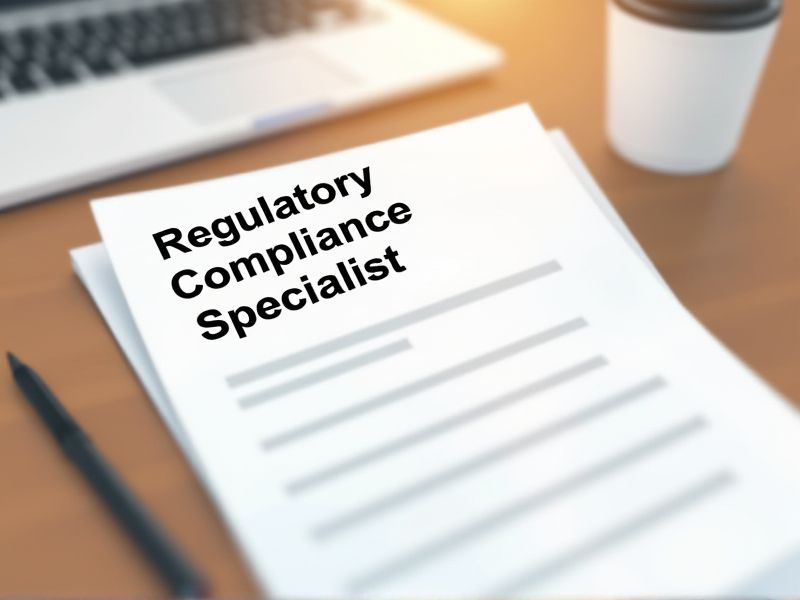
Regulatory Compliance Specialists navigate complex regulatory environments to ensure that organizations adhere to laws and standards. Certifications equip them with critical knowledge and skills to manage compliance risks effectively and efficiently. Possessing these qualifications often increases job prospects, as certifications validate expertise and dedication to continued professional development. Key certifications that may be necessary include Certified Regulatory Compliance Manager (CRCM) and Certified in Risk and Information Systems Control (CRISC).
Certified Regulatory Compliance Manager (CRCM)
The Certified Regulatory Compliance Manager (CRCM) designation enhances a Regulatory Compliance Specialist's credibility by validating their expertise in navigating complex regulatory frameworks. This certification equips specialists with up-to-date knowledge of laws and regulations, enabling them to identify and mitigate compliance risks effectively. Holding a CRCM can lead to increased trust and confidence from employers and stakeholders, fostering more robust compliance programs. As regulatory environments continually evolve, a CRCM ensures that compliance specialists remain adept and informed, maintaining organizational compliance and mitigating potential legal challenges.
Certified Compliance and Ethics Professional (CCEP)
Obtaining the Certified Compliance and Ethics Professional (CCEP) designation equips specialists with a robust framework to decipher complex regulatory requirements, thus enhancing their role in ensuring organizational compliance. The certification signifies a professional's credibility, instilling stakeholder confidence in their ability to navigate ethical challenges effectively. Enhanced understanding of compliance standards through CCEP training results in more efficient risk management, protecting the organization from potential legal repercussions. The certification fosters a culture of accountability and ethical conduct, essential for maintaining industry reputation and trust.
Certified in Healthcare Compliance (CHC)
Healthcare compliance involves numerous regulations and standards that must be adhered to, which is why the Certified in Healthcare Compliance (CHC) credential provides essential expertise to Regulatory Compliance Specialists. The complexities of healthcare laws, including privacy regulations like HIPAA, necessitate a comprehensive understanding that CHC certification ensures. Securing this credential enhances a specialist's ability to anticipate and address potential compliance risks effectively. Having CHC-certified professionals assures organizations of maintaining regulatory compliance, thereby reducing the risk of legal penalties and preserving their reputation.
Certified Financial Services Auditor (CFSA)
A Certified Financial Services Auditor (CFSA) possesses specialized knowledge essential for navigating the complex landscape of financial regulations. When a Regulatory Compliance Specialist has a CFSA, it indicates a strong proficiency in assessing risk and ensuring adherence to industry standards. This certification equips them with the skills necessary to conduct thorough audits that can identify potential compliance issues before they escalate. The ongoing education requirements for maintaining a CFSA ensure that these specialists stay current with evolving regulatory frameworks.
Certified Anti-Money Laundering Specialist (CAMS)
The Certified Anti-Money Laundering Specialist (CAMS) credential equips regulatory compliance specialists with a comprehensive understanding of anti-money laundering frameworks, enhancing their ability to detect and mitigate illicit financial activities. This certification ensures that professionals are proficient in current AML laws and global sanctions, crucial for maintaining regulatory compliance across jurisdictions. Holding a CAMS designation can foster trust with stakeholders and regulatory bodies, demonstrating a commitment to best practices in preventing financial crimes. Employers increasingly seek CAMS-certified individuals to fill compliance roles, as these specialists bring a defined skill set that reduces the risk of legal penalties for non-compliance.
Certified Fraud Examiner (CFE)
A Certified Fraud Examiner (CFE) is crucial for a Regulatory Compliance Specialist because they possess specialized knowledge in detecting and preventing fraudulent activities. By understanding complex fraud schemes, CFEs equip compliance teams with strategies to mitigate financial risk. Their expertise in investigative techniques ensures that regulatory standards are rigorously met. CFE credentials enhance a compliance specialist's ability to design robust internal controls that deter unethical behavior.
Certified Information Privacy Professional (CIPP)
The Certified Information Privacy Professional (CIPP) credential provides specialists with comprehensive, up-to-date knowledge on global privacy laws. This expertise is essential for Regulatory Compliance Specialists to effectively navigate complex legal frameworks and avoid potential penalties. Holding a CIPP designation demonstrates a commitment to maintaining high standards in privacy management, which is crucial for building trust with stakeholders. The credential also equips professionals with the skills necessary to implement robust privacy protocols, reducing the risk of data breaches and compliance violations.
Certified Risk and Compliance Management Professional (CRCMP)
The CRCMP credential equips regulatory compliance specialists with a structured framework for identifying and managing risks, ensuring they remain compliant with evolving regulations. It strengthens their ability to implement effective compliance programs, reducing the likelihood of regulatory breaches. CRCMP certification provides up-to-date knowledge of industry standards, enhancing their competence in navigating complex legal landscapes. Employers often seek CRCMP-certified individuals due to their proven expertise and commitment to maintaining ethical and compliant business practices.
Certified Compliance Professional (CCP)
A CCP provides regulatory compliance specialists with essential knowledge of laws and regulations, ensuring adherence to legal standards. The certification enhances professionals' credibility, resulting in increased trust from stakeholders. It equips specialists with the skills necessary to identify and mitigate compliance risks effectively. Organizations benefit from reduced legal liabilities when compliance specialists possess a CCP, promoting sustainable operations.
International Compliance Association Diploma in Governance, Risk and Compliance
The International Compliance Association Diploma in Governance, Risk and Compliance provides a comprehensive understanding of global regulatory frameworks, essential for navigating complex compliance environments. With the diploma, a Regulatory Compliance Specialist gains in-depth knowledge of risk management practices, enabling them to identify and mitigate potential compliance violations effectively. The diploma emphasizes practical skills and up-to-date regulatory insights, ensuring specialists are well-equipped to handle evolving legal requirements. This qualification also enhances credibility among peers and employers, increasing career advancement opportunities within the compliance field.
Summary
By obtaining certifications, you elevate your qualifications and demonstrate a strong commitment to industry standards and best practices. This often results in enhanced job performance and increased credibility among colleagues and clients. Employers may notice your certified status, potentially leading to career advancement and higher salary opportunities. The specialized knowledge gained ensures you are better equipped to navigate and implement complex regulatory requirements effectively.
